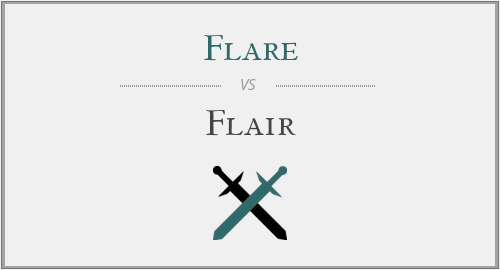Flare" and "flair" are pronounced like they are the same word, with the same signification and spelling. But while their spellings are slightly different, their meanings are actually a lot more distinct. In fact, there is absolutely no similarity or relation between the definitions of "flare" and "flair".
Make sure you never misspell them, by understanding what each signifies. We'll help you with some brief explanations.
Flare vs. Flair
"Flare" is a complex word. It is used both as a verb and as a noun. And regarding its meanings, this is also a complex discussion. "Flare" is used in several expressions, with multiple significations. You can read more about all these and how to use "flare" correct in every possible context in just a minute.
As for "flair", this one is a lot easier to remember because there's not much to understand about it, other than what it defines. "Flair" is a noun, used with two different meanings, but the second is quite similar and logical once you understand the basic definition. Let's illustrate them in some relevant examples.
When do we use "flare"?
Let's start with the verb, because this is also the first form presented by dictionaries with notoriety. "Flare" as a verb is used, in general, when referring to negative concepts such as pain or anger, defining a sudden start or worsening of that concept. It can also appear as "flare up" with the same meaning. And secondly, "to flare" can represent the action of suddenly, shortly and brightly starting to burn.
As for the meanings of "flare" as a noun, these are easily deducted from the verbs. Again, "flare" mainly represents a piece of equipment used for safety, which creates a bright signal when one is injured or lost, whereas secondly, it defines a sudden and bright light.
Example 1: The nurse only administrated him stronger treatments when his pain started to flare. - "flare" is used to illustrate how a pain gets worse.
Example 2: We could see the rocket flare before getting lost between the stars and leaving our galaxy. - "flare" also refers to the action of brightly burning, suddenly and for a short period.
Example 3: Don't forget your flare before venturing into the jungle - it will help us find you easier if you get lost. - as a noun, "flare" defines a piece of equipment that produces a bright signal if someone gets lost.
Example 4: Did you see the flare of the rocket before it disappeared from your view? - nonetheless, "flare" as a noun can also represent a bright, sudden and short flash of light.
When do we use "flair"?
Things with "flair" are slightly easier to remember, firstly because this is only used as a noun with no plural form, and secondly because its meanings are quite close. Mainly, "flair" is somehow a synonym for "talent" and "vocation", representing a natural ability or skill at doing something well. Secondly, "flair" can also define dedication or passion. More exactly, "flare" is used to illustrate an exciting and interesting way of doing something.
Example 1: He has a flair for music. - "flair" can easily be replaced with vocation or talent.
Example 2: She plays piano with great flair. - "flair" is also used to describe the exciting and interesting way of doing something with dedication and passion, such as playing the piano.
Conclusion
All the examples and explanations provided clearly demonstrate that "flare" and "flair" are both correct words in English, though they have nothing in common when it comes to the message each transmits. So make sure you don't confuse them in any circumstances, because they'll definitely turn out to be misspellings, if not used properly.
After all, it's not that complicated to keep in mind that "flare" is more similar to "flame" and it refers to light, sharp, burning pain, bright signals of light, or pieces of equipment for safety that produce bright signals, and that "flair" is a more elegant word for "passion", "vocation", "talent" or "dedication".





Have a discussion about this article with the community:
Report Comment
We're doing our best to make sure our content is useful, accurate and safe.
If by any chance you spot an inappropriate comment while navigating through our website please use this form to let us know, and we'll take care of it shortly.
Attachment
You need to be logged in to favorite.
Log In